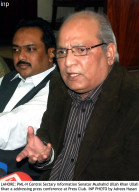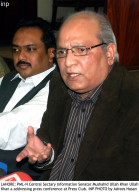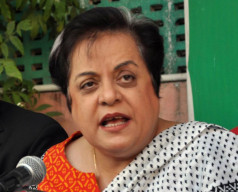
Minister for climate change, secretary of information of the ruling party, senator and a very seasoned politician, Senator Mushahidullah Khan can be called anything but an ill-informed person. Prime Minister Nawaz Sharif and his party may be distancing themselves from the interview that the ill-fated minister gave to the BBC, but they cannot veil ‘the access to information’ that the PML-N’s secretary of information has most voluntarily chosen to share with the people of Pakistan.
Some ‘political knights’ of the PML-N, who it must be noted were from the outset of their careers termed ‘military-backed’, have since long been making passing references and pointing fingers at the establishment for playing a clandestine role in supporting the PTI-led dharna. These political knights (senior ministers) may have been at fault for their continued referral to ‘the establishment’s intriguing designs’, but the prime minister showed no visible signs either of stopping the slow poison that his ministers were continuously injecting in the body of the civil-military relationship. With the civil-military balance hitting a new low after the damaging accusations levelled by a well-informed minister of his cabinet, the prime minister cannot distance himself from the controversy just by forcing the minister to resign.
The disclosures by Senator Mushahidullah Khan were not well-intended, and if anything, speak of the tendency within the PML-N to focus on the accumulation of power. The political doctrine it continues to employ is conflict-prone and power-oriented, which adversely affects the civil-military relationship in this country.
Threatened with being overpowered, the military fought and defended itself against a power-accumulating prime minister in 1999. That prime minister happened to be Nawaz Sharif. Now, when the military has challenged the enemies of Pakistan domestically, the shallow politics of benefits and certain political parties stand in its way. At the heart of the matter is the issue of relative power and the civil-military equilibrium in the country. Thinking of the civil-military relationship as a zero sum game (X can only get stronger by making Y weaker), the current Nawaz Sharif government, despite the lessons it should have learnt in the past, is failing to appreciate that toeing the political agenda of the PPP and the MQM is a lost cause. The people of Pakistan do not support any politics that seeks to harm the Pakistan Army as a state institution. They are aware that the spirit and resilience with which the military is executing targeted operations is causing sleepless nights to many corrupt politicians and their accomplices in the bureaucracy. It is this fear of being held accountable that is causing military-bashing to be a favoured option of some senior and seasoned politicians of this country.
If the federal government was pleased with recent military actions, would a senior minister of its cabinet lack the good political sense not to upset the civil-military balance? Why was he being so direct in his accusations? Has the PML-N also joined the PPP and the MQM in taking a last stand against a very popular army chief, who is being perceived as someone likely to bulldoze any opposition or obstacle that may stand in the way of the ongoing military actions? Senator Mushahidullah Khan’s outburst clearly reflects the deep-set desire of the collective will of the polity to continue conjuring conditions and circumstances which cause an interruption in the military operation and prevent it from undertaking actions against terrorists and corrupt elements with the vigour and intent with which it wants to proceed. One must not forget the famous Asif Ali Zardari quote: “Aap teen saal kay liye aatay hain, hum nay hamesha rehna hai (You are here for three years, we will stay forever).”
The ongoing military operation has entered its new phase post-August 14. It now promises to target ‘men behind the guns’, testing the ‘hamesha rehna’ concept that many politicians on the political landscape hold. It is hoped that the higher collective interests of society will rule supreme over the petty and shallow political interests of certain parties. Those who have looted and plundered this country with impunity will find it difficult to play the role of victim.
To General Raheel Sharif’s credit, he has initiated the process of internal institutional accountability at a rapid pace. One of his own personal staff officers, a senior general, has been retired. Another has been brought back from a UN mission and handed retirement orders. Today, accountability is the buzzword in the military, with many senior officers being asked to face internal inquiries.
General Raheel Sharif and his military operation need political and public support to be a success. Pakistan stands at the threshold of an important change and the man who is likely to play a huge role in achieving it for Pakistan is the chief of the army staff. No wonder he is making so many enemies. What has happened in the past is history. Both the military and civilian leaderships are responsible for the many evils that our society faces today. But nothing should stop a determined leadership to rewrite history and turn the tables. I cannot help but quote two couplets of the famed Punjabi poet Ustad Daman:
“Jaagan waaleyan nay rajj ke lutya aae/Soye tusi vi ho, soye asi vi aan/ Lali akhiyan di pay dasdi aae/Roye tusi vi ho, roye asi vi aan (The awake looted mercilessly/While you slept and so did we/The redness of the eyes tell us/Many a tear have you wept and so have we).”
Published in The Express Tribune, August 18th, 2015.
Like Opinion & Editorial on Facebook, follow @ETOpEd on Twitter to receive all updates on all our daily pieces.




























































COMMENTS (10)
Comments are moderated and generally will be posted if they are on-topic and not abusive.
For more information, please see our Comments FAQ